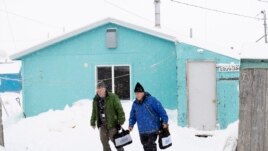24 January 2020
This week, the U.S. Census to count everyone who lives in the country started in a small Alaska town called Toksook Bay.
The count starts in Alaska for several reasons. Traveling to some of the places there is difficult. In the winter, when the ground is very cold, census workers can travel more easily.

Census bureau director Steven Dillingham, right, walks alongside Census worker Tim Metzger after conducting the first enumeration of the 2020 Census Tuesday, Jan. 21, 2020, in Toksook Bay, Alaska.
Census workers are also more likely to find people at home in the winter. In the spring and summer, Alaskans may be away from home fishing, hunting or doing warm-weather jobs.
Constitutional requirement
The U.S. government has done a census every ten years, beginning in 1790. This year's has some new ways to answer the survey, and new questions about one's ancestors.
In the past, the census had only had one choice for ethnicity, such as "White," "Black," "Indian" or "Other."
The 2020 form allows people to claim more than one ethnicity. Emily Edenshaw is Director of the Alaskan Native Heritage Center. She spoke about her search for her family roots.
"...On the 1900 census, it had my great-grandfather listed on there, and next to his name, it said, 'mixed.' ... I remember feeling really confused. ... But I'll never forget having the conversation with my auntie when she said, 'Hm. Mixed. Almost as if he's a breed of something.'" In American English, the word 'mixed' is used for a pet of unknown origin.
Edenshaw says she is happy that this word is no longer on the census form. In 2020, there is a blank space to write in the original country or tribe of one's family.
This year's survey also asks more exactly about people's possible Hispanic, Latino, or Spanish origins. Respondents can claim Mexican, Puerto Rican, Cuban, or another heritage.
Counting the homeless
Every year, the U.S. Census plans to make sure there is a good count of people who have no home. This year, plans are to make a special effort to count homeless people on these three days:
- March 30, 2020: Count people in temporary housing for the homeless
- March 31, 2020: Count people in places where free food is available
- April 1, 2020: Count people outdoors, in tents, and on the streets.
This count will help to assign the right amount of government money to support the programs that serve the homeless.
Census Day is April 1
April 1, 2020 is Census Day: every home will be asked to respond by that day.
Beginning in March, residents will have a chance to answer the survey online, by phone, or on paper. The main paper questionnaire is in English and Spanish. In Alaska, native language workers in Tooksok Bay translated the census into Yupik, Yupiak, Gwich'in and Athabascan. For Census workers, the questions will be available in 60 languages.
This is the first year for the online census. Other digital tools are in place to make a better count, such as mapping and a new app for workers to use as they walk around from house to house.
In the years between the main census, the U.S. Census Bureau does smaller surveys and also tests questions and ways to collect information. For example, the American Community Survey (ACS) helps local officials understand changes in their communities.
I'm Jill Robbins.
Jill Robbins wrote this story based on U.S. Census Bureau publications for Learning English. Kelly Jean Kelly was the editor.
________________________________________________________________
Words in This Story
census – n. the official process of counting the number of people in a country, city, or town and collecting information about them
form – n. a document with blank spaces for filling in information
survey – n. an activity in which many people are asked a question or a series of questions in order to gather information about what most people do or think about something
assign – v. to give out something or to provide someone with something
Does your country count its people? How important are the numbers to your daily life? We want to hear from you. Write to us in the Comments Section.